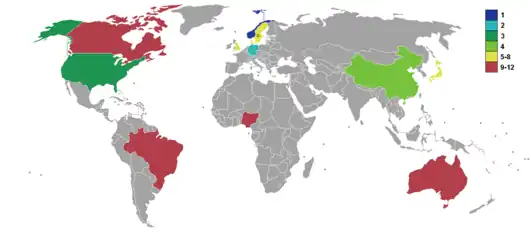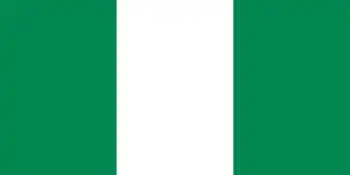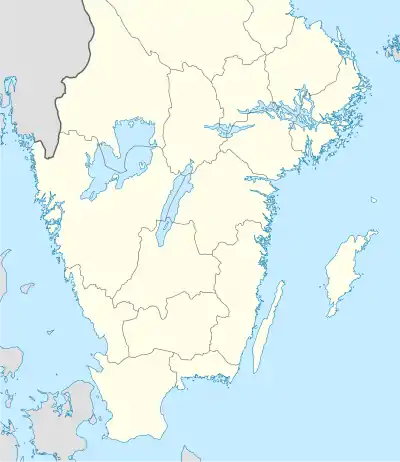1995 FIFA Women's World Cup
The 1995 FIFA Women's World Cup, the second edition of the FIFA Women's World Cup, was held in Sweden and won by Norway, who became the first European nation to win the Women's World Cup.[1][2][3] The tournament featured 12 women's national teams from six continental confederations. The 12 teams were drawn into three groups of four and each group played a round-robin tournament. At the end of the group stage, the top two teams and two best third-ranked teams advanced to the knockout stage, beginning with the quarter-finals and culminating with the final at Råsunda Stadium on 18 June 1995.
| Världsmästerskapet i fotboll för damer 1995 | |
|---|---|
 Official logo | |
| Tournament details | |
| Host country | Sweden |
| Dates | 5–18 June |
| Teams | 12 (from 6 confederations) |
| Venue(s) | 5 (in 5 host cities) |
| Final positions | |
| Champions | |
| Runners-up | |
| Third place | |
| Fourth place | |
| Tournament statistics | |
| Matches played | 26 |
| Goals scored | 99 (3.81 per match) |
| Attendance | 112,213 (4,316 per match) |
| Top scorer(s) | |
| Best player(s) | |
| Fair play award | |
Sweden became the first country to host both men's and women's World Cup, having hosted the men's in 1958.
Australia, Canada, and England made their debuts in the competition. The tournament also hosted as qualification for the 1996 Summer Olympics, with the eight quarter-finalists being invited to the Olympics. In the second edition of the Women's World Cup, matches were lengthened to the standard 90 minutes, and three points were awarded for a win.[4]
Summary
Bulgaria was originally awarded hosting rights for the tournament, but had to relinquish the rights and FIFA ended up awarding the tournament to Sweden.[5] About 112,000 tickets were sold for the entire tournament.[6]
As a FIFA rules experiment, each team was allowed a two-minute time out each half.[7]
Norway won the 1995 title, with one in four Norwegians watching the game on television. Norway's team plane was escorted back to Oslo by two F-16s on their way to a victory celebration.[1]
Venues
|
Teams

As in the previous edition of the FIFA Women's World cup, held in 1991, 12 teams participated in the final tournament. The teams were:
Squads
For a list of the squads that competed in the final tournament, see 1995 FIFA Women's World Cup squads.
Match officials
|
| ||||||||||||||||||||||||||||||||||||||||||||||||||||||||
Notes
- Also served as an assistant referee for one match.
Draw
The draw for the group stage was held on 18 February 1995 in a public ceremony at the Elite Hotel Marina Plaza in Helsingborg, Sweden. The draw was conducted by Sepp Blatter, then the FIFA General Secretary, and assisted by Swedish internationals Tomas Brolin and Kristin Bengtsson, winners of the 1994 Guldbollen and Diamantbollen, respectively. There was no television coverage of the draw.[8]
Group stage
| Tie-breaking criteria for group play |
|---|
The ranking of teams in the group stage was determined as follows:[9]
|
Group A
| Pos | Team | Pld | W | D | L | GF | GA | GD | Pts | Qualification |
|---|---|---|---|---|---|---|---|---|---|---|
| 1 | 3 | 2 | 0 | 1 | 9 | 4 | +5 | 6 | Advance to knockout stage | |
| 2 | 3 | 2 | 0 | 1 | 5 | 3 | +2 | 6 | ||
| 3 | 3 | 1 | 0 | 2 | 2 | 4 | −2 | 3 | ||
| 4 | 3 | 1 | 0 | 2 | 3 | 8 | −5 | 3 |
Group B
| Pos | Team | Pld | W | D | L | GF | GA | GD | Pts | Qualification |
|---|---|---|---|---|---|---|---|---|---|---|
| 1 | 3 | 3 | 0 | 0 | 17 | 0 | +17 | 9 | Advance to knockout stage | |
| 2 | 3 | 2 | 0 | 1 | 6 | 6 | 0 | 6 | ||
| 3 | 3 | 0 | 1 | 2 | 5 | 13 | −8 | 1 | ||
| 4 | 3 | 0 | 1 | 2 | 5 | 14 | −9 | 1 |
Group C
| Pos | Team | Pld | W | D | L | GF | GA | GD | Pts | Qualification |
|---|---|---|---|---|---|---|---|---|---|---|
| 1 | 3 | 2 | 1 | 0 | 9 | 4 | +5 | 7 | Advance to knockout stage | |
| 2 | 3 | 2 | 1 | 0 | 10 | 6 | +4 | 7 | ||
| 3 | 3 | 1 | 0 | 2 | 6 | 5 | +1 | 3 | ||
| 4 | 3 | 0 | 0 | 3 | 3 | 13 | −10 | 0 |
Group C started with back-and-forth 3–3 draw between the United States and China with the Chinese coming back from a 3–1 deficit. Denmark's opening 5–0 win over Australia, in which Sonia Gegenhuber was sent off in the 45th minute for the Aussies, ultimately led to their securing one of the best third place runner up spots as they would lose their next two matches.[10]
United States goalkeeper Brianna Scurry was sent off in the 88th minute of the second group game against Denmark. With all three substitutions used, U.S. manager Tony DiCicco called upon striker Mia Hamm to play goalkeeper. Hamm made two saves over eight minutes of stoppage time to secure the 2–0 win.[11] In the other game, Angela Iannotta scored Australia's first-ever World Cup goal, but China defeated the Matildas 4–2.[10]
| United States | 3–3 | |
|---|---|---|
| Report |
|
| China | 4–2 | |
|---|---|---|
|
Report |
| China | 3–1 | |
|---|---|---|
|
Report |
|
Knockout stage
Bracket
| Quarter-finals | Semi-finals | Final | ||||||||
| 13 June – Västerås | ||||||||||
| 3 | ||||||||||
| 15 June – Helsingborg | ||||||||||
| 0 | ||||||||||
| 1 | ||||||||||
| 13 June – Helsingborg | ||||||||||
| 0 | ||||||||||
| 1 (3) | ||||||||||
| 18 June – Solna | ||||||||||
| 1 (4) | ||||||||||
| 0 | ||||||||||
| 13 June – Gävle | ||||||||||
| 2 | ||||||||||
| 0 | ||||||||||
| 15 June – Västerås | ||||||||||
| 4 | ||||||||||
| 0 | ||||||||||
| 13 June – Karlstad | ||||||||||
| 1 | Third place play-off | |||||||||
| 3 | ||||||||||
| 17 June – Gävle | ||||||||||
| 1 | ||||||||||
| 0 | ||||||||||
| 2 | ||||||||||
Quarter-finals
Third place play-off
Awards
The following awards were given at the conclusion of the tournament:[12]
| Golden Ball | Silver Ball | Bronze Ball |
|---|---|---|
| Golden Shoe | Silver Shoe | Bronze Shoe |
| 6 goals, 0 assists | 5 goals, 5 assists | 3 goals, 2 assists |
| FIFA Fair Play Award | ||
Statistics
Goalscorers
There were 99 goals scored in 26 matches, for an average of 3.81 goals per match. Ann Kristin Aarønes of Norway won the Golden Shoe award for scoring six goals.
6 goals
5 goals
3 goals
2 goals
1 goal
.svg.png.webp) Lisa Casagrande
Lisa Casagrande.svg.png.webp) Sunni Hughes
Sunni Hughes.svg.png.webp) Angela Iannotta
Angela Iannotta Pretinha
Pretinha.svg.png.webp) Helen Stoumbos
Helen Stoumbos Liu Ailing
Liu Ailing Sun Qingmei
Sun Qingmei Wang Liping
Wang Liping Zhou Yang
Zhou Yang Christina Bonde
Christina Bonde Anne Dot Eggers Nielsen
Anne Dot Eggers Nielsen Christina Hansen
Christina Hansen Helle Jensen
Helle Jensen Marieanne Spacey
Marieanne Spacey Karen Walker
Karen Walker Anouschka Bernhard
Anouschka Bernhard Ursula Lohn
Ursula Lohn Silvia Neid
Silvia Neid Birgit Prinz
Birgit Prinz Martina Voss
Martina Voss Patience Avre
Patience Avre Gro Espeseth
Gro Espeseth Tone Haugen
Tone Haugen Randi Leinan
Randi Leinan Tina Svensson
Tina Svensson Anneli Andelén
Anneli Andelén Ulrika Kalte
Ulrika Kalte Pia Sundhage
Pia Sundhage Lena Videkull
Lena Videkull Joy Fawcett
Joy Fawcett Julie Foudy
Julie Foudy Debbie Keller
Debbie Keller Carla Overbeck
Carla Overbeck
Assists
6 assists
5 assists
3 assists
2 assists
1 assist
.svg.png.webp) Lizzy Claydon
Lizzy Claydon.svg.png.webp) Sunni Hughes
Sunni Hughes Fanta
Fanta.svg.png.webp) Silvana Burtini
Silvana Burtini Sun Qingmei
Sun Qingmei Sun Wen
Sun Wen Wei Haiying
Wei Haiying Jeanne Axelsen
Jeanne Axelsen Annette Laursen
Annette Laursen Lene Madsen
Lene Madsen Karen Farley
Karen Farley Hope Powell
Hope Powell Marieanne Spacey
Marieanne Spacey Anouschka Bernhard
Anouschka Bernhard Maren Meinert
Maren Meinert Heidi Mohr
Heidi Mohr Martina Voss
Martina Voss Bettina Wiegmann
Bettina Wiegmann Nami Otake
Nami Otake Rie Yamaki
Rie Yamaki Patience Avre
Patience Avre Maureen Mmadu
Maureen Mmadu Rita Nwadike
Rita Nwadike Merete Myklebust
Merete Myklebust Marianne Pettersen
Marianne Pettersen Heidi Støre
Heidi Støre Malin Flink
Malin Flink Ulrika Kalte
Ulrika Kalte Helen Nilsson
Helen Nilsson Joy Fawcett
Joy Fawcett Kristine Lilly
Kristine Lilly Tisha Venturini
Tisha Venturini
Source: FIFA Technical Report[13]
Tournament ranking
Per statistical convention in football, matches decided in extra time are counted as wins and losses, while matches decided by penalty shoot-outs are counted as draws. Teams eliminated in the quarter-finals are ranked by their quarter-final goal differential.
| Pos | Grp | Team | Pld | W | D | L | GF | GA | GD | Pts | Final result |
|---|---|---|---|---|---|---|---|---|---|---|---|
| 1 | B | 6 | 6 | 0 | 0 | 23 | 1 | +22 | 18 | Champions | |
| 2 | A | 6 | 4 | 0 | 2 | 13 | 6 | +7 | 12 | Runners-up | |
| 3 | C | 6 | 4 | 1 | 1 | 15 | 5 | +10 | 13 | Third place | |
| 4 | C | 6 | 2 | 2 | 2 | 11 | 10 | +1 | 8 | Fourth place | |
| 5 | A | 4 | 2 | 1 | 1 | 6 | 4 | +2 | 7 | Eliminated in quarter-finals | |
| 6 | B | 4 | 2 | 0 | 2 | 6 | 9 | −3 | 6 | ||
| 7 | C | 4 | 1 | 0 | 3 | 7 | 8 | −1 | 3 | ||
| 8 | A | 4 | 1 | 0 | 3 | 2 | 8 | −6 | 3 | ||
| 9 | A | 3 | 1 | 0 | 2 | 3 | 8 | −5 | 3 | Eliminated in group stage | |
| 10 | B | 3 | 0 | 1 | 2 | 5 | 13 | −8 | 1 | ||
| 11 | B | 3 | 0 | 1 | 2 | 5 | 14 | −9 | 1 | ||
| 12 | C | 3 | 0 | 0 | 3 | 3 | 13 | −10 | 0 |
References
- "WOMEN'S WORLD CUP; Norway's Rivalry With U.S. Is Intense". The New York Times. 13 June 1999. Retrieved 2 August 2012.
- "Norway Women Win World Cup – Chicago Tribune". Articles.chicagotribune.com. 19 June 1995. Retrieved 2 August 2012.
- "Raising Their Game: Enjoying it in 1995". YouTube. 14 June 2012. Archived from the original on 28 September 2014. Retrieved 2 August 2012.
- Williams, Jean (1 November 2007). A Beautiful Game: International Perspectives on Women's Football. Berg Publishers. p. 4. ISBN 978-1-84788-345-2.
Some of the terms and conditions had been changed this time: 90 minutes of play instead of 80 in China, a full group of 20 players instead of 18, three points for a win, and the experiment with time out.
- Russo, Anthony (12 April 2015). "1995 Women's World Cup".
- "WOMEN'S WORLD CUP: Soccer's biggest event a week away". Kitsap Sun. 13 June 1999.
- Goff, Steven (4 June 1995). "Women's World Cup '95 Sweden". The Washington Post.
- "Statistical Kit – The Draw for the FIFA Women's World Cup France 2019" (PDF). FIFA.com. Fédération Internationale de Football Association. 6 December 2018. p. 39. Archived from the original (PDF) on 30 August 2020. Retrieved 8 January 2020.
- Regulations of the 2nd FIFA World Championship for Women's Football 1995. FIFA. 1995. p. 18.
- Peter Georgaras; Steve Darby; Andre Kruger; Thomas Esamie. "Matildas Internationals for 1995". OzFootball.
- Yoesting, Travis (4 April 2019). "TBT: Remember When Mia Hamm Played Goalie at the Women's World Cup?". the18.com.
- Awards 1995
- Statistics – 2nd FIFA Women's World Cup Sweden 1995. 1995.
{{cite book}}:|work=ignored (help)CS1 maint: location missing publisher (link) - "FIFA Women's World Cup 1995 – Technical Report, Part 1: Table" (PDF). FIFA.com. Fédération Internationale de Football Association. p. 14 (15 of PDF). Retrieved 1 July 2019.
